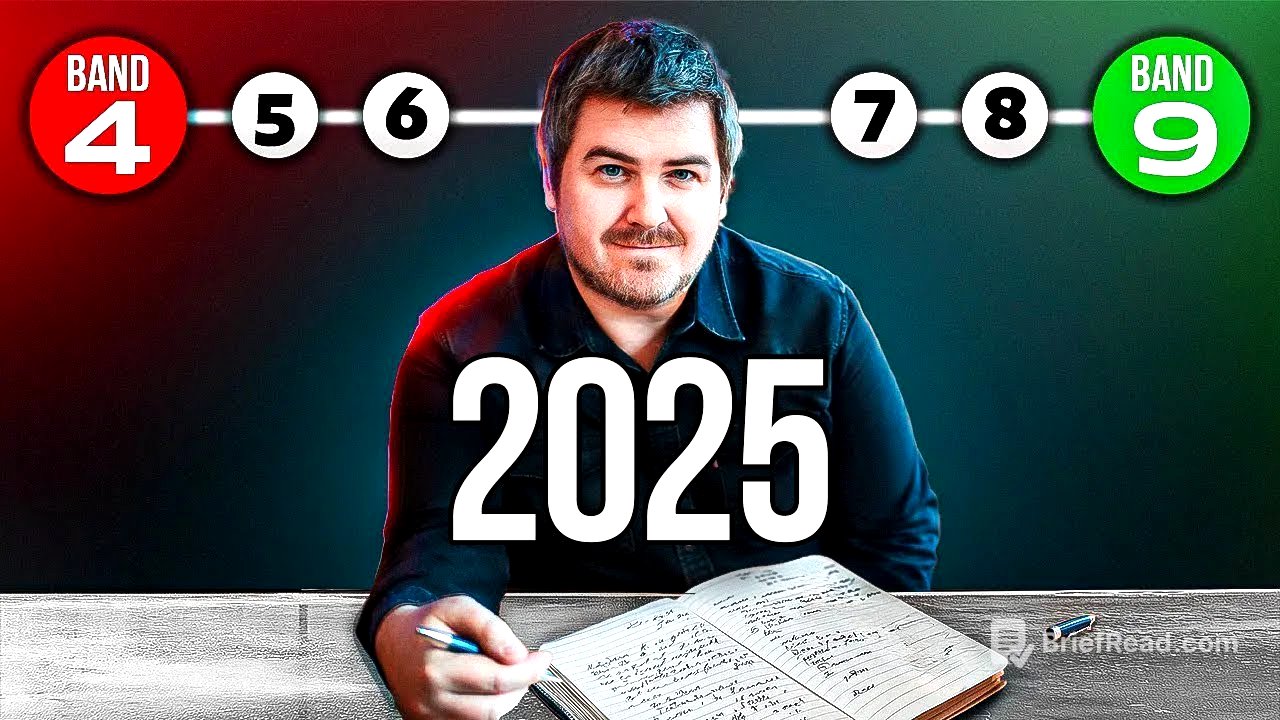TLDR;
This comprehensive guide to IELTS Writing Task 2 provides a step-by-step approach to answering any question, improving scores, and cutting preparation time. It emphasizes the importance of understanding the marking criteria, avoiding common mistakes, and focusing on clear communication rather than memorization. The guide includes strategies for idea generation, essay structuring, and vocabulary use, along with real band 7, 8, and 9 sample essays and advanced grammar and vocabulary tools.
- Focus on clear communication and answering the question directly.
- Avoid memorization and templates.
- Understand and address your weaknesses.
- Use simple, accurate language.
Introduction [0:00]
The video introduces a comprehensive guide to IELTS Writing Task 2, promising a step-by-step approach to answering any question, providing numerous band 7, 8, and 9 samples, and sharing strategies used by successful students. It also offers exclusive grammar and vocabulary tools and a live band 9 essay writing demonstration. The initial focus is on the fastest way to improve writing skills and a golden rule for IELTS writing.
Fastest Way to Improve [0:59]
The fastest way to improve IELTS writing scores involves targeted practice on individual weaknesses rather than overwhelming students with excessive information. By administering two simple tests, students can identify their specific areas for improvement, leading to significant score increases and reduced study time. The key is to focus on the marking criteria and address weaknesses in task response, coherence and cohesion, lexical resource, and grammatical range and accuracy.
Tips and Tricks [10:07]
Common IELTS writing tips, such as using high-level vocabulary and complex linking words, can actually lower scores if not applied correctly. The focus should be on natural and accurate language use, clear communication, and avoiding overuse or inappropriate use of linking words. Grammatical range is important, but accuracy is more critical for achieving a high band score.
4 Key Rules [48:50]
The four key rules for improving IELTS writing scores include clarifying your goal, eliminating unnecessary modules, optimizing weaknesses, slowing down to focus on improvement, and accelerating practice only after addressing weaknesses. The primary goal is to achieve the required IELTS score as quickly as possible, and a clear understanding of the question is essential for a high score.
How to Write an Introduction [1:03:30]
A good introduction should paraphrase the question and clearly state your position with main ideas. Avoid hooks, clichés, memorized language, and overly complex vocabulary. The introduction should provide a roadmap for the essay, making it easier for both the writer and the examiner.
Band 9 Ideas [1:23:35]
To generate band 9 ideas, focus on real IELTS questions, common topics, and simple, relevant ideas that can be quickly developed. Avoid brainstorming and instead use techniques like the "coffee shop method" or the "family fortunes method" to think of straightforward, easily explainable ideas.
Band 9 Examples [1:38:20]
High-level examples in IELTS writing should be specific, relevant, and based on real-life experiences. Avoid overly personal or vague examples and statistics that don't make sense. Instead, focus on examples that are connected to the main idea and can be easily understood by the reader.
69 Advanced Words [1:56:47]
The video presents 69 commonly used words by band 7, 8, and 9 students, emphasizing accurate and appropriate usage over mere memorization. It uses software to analyze real essays and demonstrates that high-scoring essays primarily use A1, A2, B1, and B2 level words. The key is to use all levels of vocabulary accurately and appropriately.
From Band 6 to 8 [2:53:05]
Transforming a band 6 essay to a band 8 involves avoiding common mistakes such as background statements, memorized language, and irrelevant ideas. The focus should be on answering the question clearly, developing ideas fully, and reducing grammatical and vocabulary errors. The video provides a step-by-step transformation of a sample essay to illustrate these points.
Opinion Essay [3:38:49]
To effectively tackle opinion essays, it's crucial to understand the question, generate relevant ideas, and clearly state your position. The introduction should paraphrase the question and present your opinion with main ideas, while the main body paragraphs should develop those ideas with explanations and examples.
Problem Solution Essay [4:23:55]
A problem and solution essay should follow a clear structure: paraphrase the question and state the problem and solution in the introduction, dedicate one paragraph to explaining the problem and another to explaining the solution, and summarize both in the conclusion. Focus on relevant, well-developed ideas and clear explanations.
Discussion Essay [4:40:42]
For discussion essays, it's important to think critically by considering why other people hold different views and then stating your own opinion. The essay structure should include an introduction that discusses both views and gives your opinion, main body paragraphs that explain each view, and a conclusion that summarizes the main points.
How to Use Samples [4:47:23]
To effectively use sample essays, avoid fake samples, passive reading, and trying to find reasons why the essays are not good. Instead, focus on improving idea generation, developing ideas, understanding structure, identifying linking words, and correcting grammar and vocabulary mistakes.
IELTS Writing Task 2 Test Demo [5:11:05]
The video concludes with a live recording of the author completing an IELTS Writing Task 2 test, demonstrating how to think through the question and structure the essay. The author emphasizes the importance of clear communication, accurate language use, and avoiding overcomplicated vocabulary.









